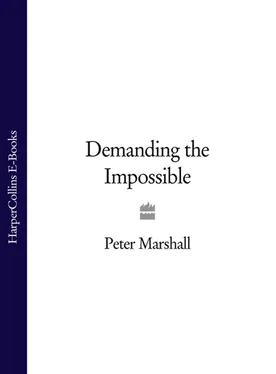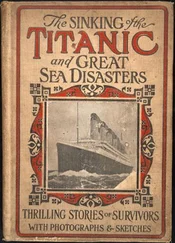Afraid of those who would invade his ‘sphere of discretion’ and reduce him to clockwork uniformity, Godwin felt compelled to conclude that ‘everything that is usually understood by the term co-operation is, in some degree, an evil.’ 26 But the more collectivist anarchist thinkers like Proudhon, Bakunin and Kropotkin believed that since we are social beings we can only be free to realize ourselves in the company of others, Individuality, in their case, is based on reciprocal awareness. As Proudhon put it, the individual ‘recognizes his own self in that of others’. 27 People need not therefore be a threat but a help.
Anarchists experience freedom as potentially joyous. Malatesta became an anarchist precisely because of his aspirations towards a society which reconciles ‘the liberty of everyone with co-operation and love among men’. For him freedom is not an abstract right but the possibility of acting. It is the isolated individual who is powerless; it is ‘by co-operation with his fellows that man finds a means to express his activity and his power of initiative’. 28
While celebrating personal and social freedom as a central if not supreme ideal, anarchists are strongly aware that it cannot easily be achieved. They are aware of the strong social, cultural and psychological obstacles which block the way to a free society. Randolph Bourne not only noted that war is the health of the State but that a herd instinct drives the individual into obedience and conformity since ‘You feel powerful by conforming, and you feel forlorn and helpless if you are out of the crowd’. The State—‘the organization of the entire herd’—is founded on these impulses and makes careful use of them. 29 Anarchists are also aware, as Erich Fromm pointed out, that many people fear freedom because of the responsibility it entails and in times of economic insecurity and social unrest look to strong leaders to tell them what to think and do. Isolated and rootless individuals in modern society readily resort to devotion and submission to authoritarian organizations or the State. Like Adam after his expulsion from the Garden of Eden for rebelling against the authority of God, newly won freedom can appear to modern man as a curse; ‘he is free from the sweet bondage of paradise, but he is not free to govern himself, to realize his individuality.’ 30
Again, anarchists appreciate the insights of Wilhelm Reich who has shown how the subject person only too easily becomes an active participant in his own subjection. The utter powerlessness of the modern citizen can often lead to the primary masochism of internalized submissiveness so that he begins to identify with the agent who has thwarted his vital energy. He becomes, as Etienne de la Boétie pointed out, a voluntary slave. Moreover, modern man’s experience of our ancient patriarchal and authoritarian society and culture encourages ‘an armouring against nature within himself and against social misery outside himself ’ leading to ‘helplessness, craving for authority, fear of responsibility, mystical longing, sexual misery’. 31
Yet for all their appreciation of the psychology of obedience and dependence and the powerful influence of the State and culture in shaping conforming citizens, anarchists still believe that all human beings are ultimately capable of breaking out of the Crystal Palace, of releasing themselves from their physical manacles and mental chains of illusion. They call for freedom for all from all forms of imposed authority as well as the freedom to achieve the active realization of the individual self.
Clearly anarchists do not have a naive or crude view of freedom. Moreover, their aspiration to create a free society need no longer appear a utopian dream as it has done in the past. Malatesta at the turn of the century argued that ‘All specifically human life is a struggle against outside nature, and every forward step is adaptation, is the overcoming of a natural law’. 32 In our post-scarcity society of relative abundance, the objective conditions are there (in the West at least) to enable us to pass from the historic realm of economic necessity to the realm of freedom. For the first time in human history, we are now free to choose our needs. Desire no longer may be seen as a form of bondage to be controlled by reason since the free satisfaction of desire is possible to a large degree. Indeed, Bookchin has even argued that human beings while freeing themselves are now in a position to create a ‘ free nature’ by helping it to realize its evolutionary trend towards consciousness and subjectivity. 33
Of all political doctrines, anarchism responds most to the deeply felt human need for freedom which is essential for creativity and fulfilment. It holds up the ideal of personal freedom as a form of autonomy which does not restrict the freedom of others. It proposes a free society without government in which people make their own free structures. It looks to a time when human beings are not only free from each other, but are able to help each other and all life-forms to realize their full potential.
Another way of saying that anarchism takes freedom as its ultimate goal is to claim that it opposes authority. ‘All anarchists’, George Woodcock insists, ‘deny authority’. 34 Certainly many anarchists have argued this to be the case. Bakunin, who called himself an ‘anti-authoritarian’, advocated the ‘ absolute rejection of every authority ’ while Kropotkin maintained that anarchism works ‘to destroy authority in all its aspects’. 35 Malatesta also defined anarchy as ‘ society organized without authority ‘, meaning by authority ‘the power to impose one’s will’. 36 More recently, Colin Ward has called an anarchist society ‘a society which organizes itself without authority’. 37
This definition of anarchism as an opposition to authority comes from the common definition of the State as the supreme authority within a given territory, and since all anarchists are opposed to the State, it is inferred that they are opposed to authority. Authority however is more fundamental and exists prior to the foundation of the State. In addition, it might be misleading to define anarchy as an absence of authority for strictly speaking it would appear that a society without some form of authority is virtually inconceivable. 38
Nevertheless, it is true to say that all anarchists are opposed to political authority in the sense that they deny anyone the legitimate right to issue commands and have them obeyed. As Robert Paul Wolff has argued, since ‘the state is authority, the right to rule’, anarchism which rejects the State is the only political doctrine consistent with autonomy in which the individual alone is the judge of his moral constraints. 39 Anarchists also reject legal authority as defined by Max Weber as ‘a belief in the “legality” of enacted rules and the right of those elevated to authority under such rules to issue commands’. 40 Communist anarchists further reject what they call ‘economic authority’; as Faure pointed out, ‘Authority dresses itself in two principal forms: the political form, that is the State; and the economic form, that is private property’. 41
Anarchists however are less clear-cut about traditional authority resting on a belief in ancient traditions and the legitimacy of the holders of the tradition. Kropotkin, for instance, stressed repeatedly that customs precede man-made laws to regulate human affairs, and thought they could replace them again in the future. Proudhon even accepted the need for patriarchal authority within the family while opposing it in wider society. Anarchists are also prone to being influenced by charismatic authority, that is by the exemplary character of an exceptional person. Godwin appeared to Shelley as a wise mentor and did not reject the role. Bakunin undoubtedly possessed enormous charisma and exploited it to influence his comrades. Many were also affected by Kropotkin’s saintly aura and were prepared to be his followers. Apart from Bakunin, they all saw the dangers of unthinking obedience to or slavish imitation of a leader.
Читать дальше












